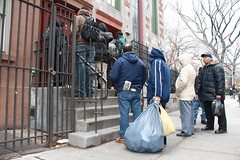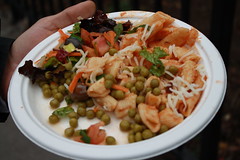 Liz Wagner Homeless and needy line up for free lunch outside Trinity Lower East Side Lutheran Parish on East Ninth Street and Avenue B. The pastor of the church says that its soup kitchen is being stretched thin by an uptick in need.
Liz Wagner Homeless and needy line up for free lunch outside Trinity Lower East Side Lutheran Parish on East Ninth Street and Avenue B. The pastor of the church says that its soup kitchen is being stretched thin by an uptick in need.Joey Ortiz has been coming to Trinity Lower East Side Parish on Ninth Street and Avenue B for a hot lunch nearly every weekday for two years. He’s been struggling to make ends meet since he lost his job working in an optometrist’s office at the SUNY Downstate Medical Center in Brooklyn. One recent afternoon, he stood in the soup kitchen line for 20 minutes with dozens of people in front of and behind him. While Mr. Ortiz says he has never been denied a meal, he wonders how long the church will be able to feed an increasing number of hungry New Yorkers.
“You see how many people,” Mr. Ortiz said pointing to the growing line. “There is not enough food. There is more need.”
Pastor Phil Trzynka says Trinity’s nonprofit, Services and Food for the Homeless, Inc., is seeing more needy people now than ever before, but can still meet the demand. He says the soup kitchen, which provides lunches Monday through Friday, serves 235 meals a day — up from 150 meals five years ago. But Mr. Trzynka also says the church’s budget is $30,000 less than what it was last year because government grant money and individual donations are down. He says the Lutheran parish which serves all denominations and has operated a soup kitchen since the 1950’s, is being stretched thin.
“We have no funds to draw on anymore,” he said. “This year will be a year to decide how the program will continue.”
According to the annual hunger report released in November by the New York City Coalition Against Hunger, demand at the city’s soup kitchens and food pantries increased almost 7 percent in 2010, on top of a nearly 21 percent increase in 2009. This year 51 percent of agencies indicated they were not able to meet current demand, down from 55 percent in 2009 and nearly 69 percent in 2008, according to report.
The report states that a boost in federal anti-hunger funding through the stimulus package in 2010 and 2009 “prevented a greater hunger catastrophe,” but added that the organization believes it is “totally unacceptable” for more than half of New York City’s kitchens and pantries to lack food.
Trinity is among the soup kitchens and pantries able to meet the demand for food.
On a recent afternoon, Mr. Ortiz and others stood in line outside the soup kitchen to receive plates of peas, pasta and salad.
It’s “not steak and lobster,” said a man named Peter Michael, who spends his nights at the Bowery Mission, adding that at least there was “plenty to eat.”
Graffiti Church, a Baptist congregation on Seventh Street and Avenue B, provides bag lunches to people on Saturdays in Tompkins Square Park. One recent Saturday the line for hot coffee and lunch spanned more than half the southern perimeter of the park on Seventh Street.
Among those distributing food there was Pastor Taylor Field, who said he began handing out meals 30 years ago when the park was a homeless tent city and a haven for drug addicts. He says he has noticed a rise in the number of people requesting food over the last few years and that an increasing number of them are parents who have been laid off from their jobs.
“I would say that the need is about as great as it’s ever been,” Mr. Field said.




